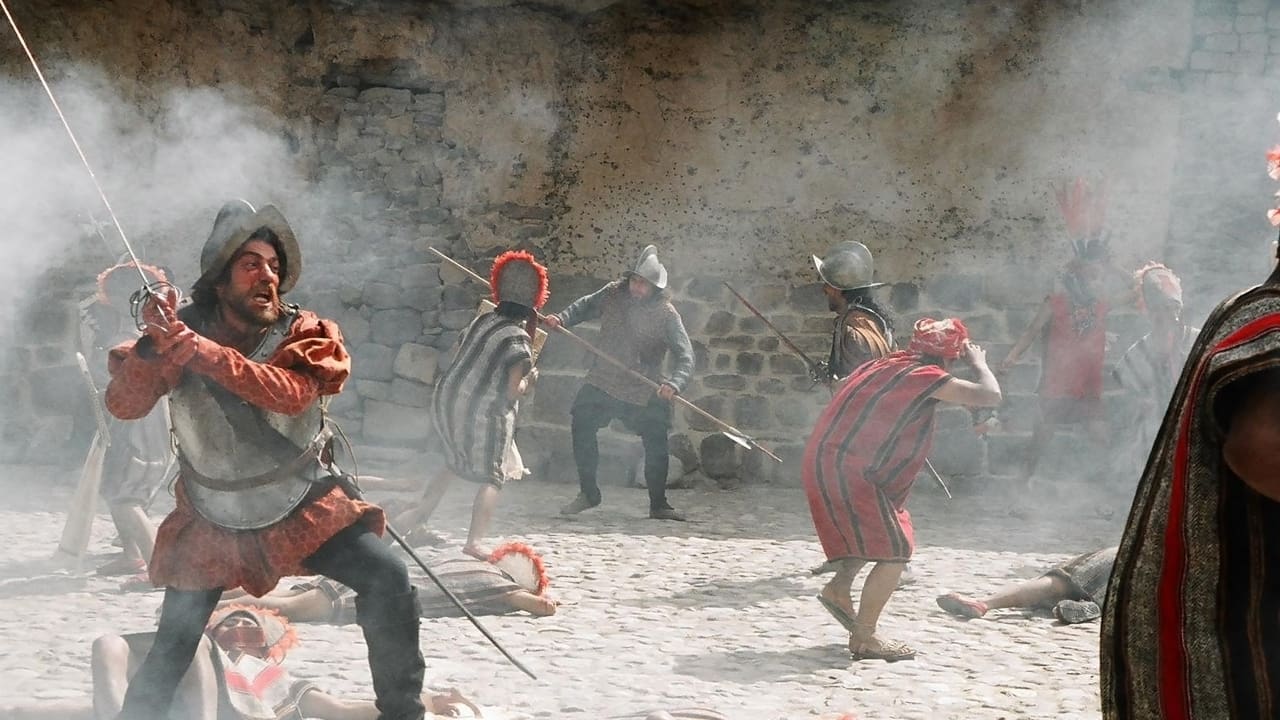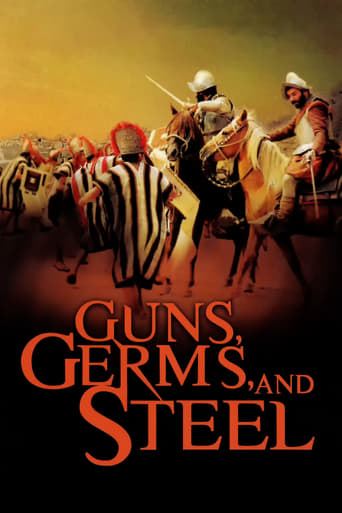Matcollis
This Movie Can Only Be Described With One Word.
TaryBiggBall
It was OK. I don't see why everyone loves it so much. It wasn't very smart or deep or well-directed.
Fairaher
The film makes a home in your brain and the only cure is to see it again.
Bob
This is one of the best movies I’ve seen in a very long time. You have to go and see this on the big screen.
SnoopyStyle
Jared Diamond is a professor in UCLA specializing in biology. He endeavors to explain why world history unfolded as it did. Why did certain groups dominate while others ended up so far behind? He starts with a journey to Papa New Guinea. His theory is generally that everybody is the same but certain locations allow for better opportunities. Eurasia had the better crops and animals for domestication. Domestication also allow for germs to develop. Also the east west travel within common climate allowed an easier trade route which advanced technologies even further. And geography explains why China and other monolithic middle east empires stagnated whereas Europe's geography favors a bulkanized map and tougher competitions from close neighbors.In general terms, I have no big problems with his theory. It doesn't add a whole lot to understanding the world. He's not discover something new as much as reorganizing what everybody already knows. There are ideas and concepts that are ignored too easily. There is a lot of generalization but that's the theory. It's trying to generalize the whole of human history with a few simple ideas. The theory is noteworthy for what's not in it as much as what's in it. It's just that I wish there is some definitive mathematical evidence to verify his theory. Also world history has a tendency to be more muddy than what's presented here.
Arel
This series adds new information and background to the book and includes personal appearances by the author and by archaeologists and other anthropologists. It brings the book to life and makes even more sense of the author's subsequent opus, *Collapse*.Diamond himself comes off as personable and caring, not just a disinterested or disengaged academic. This series makes it clear that his book was not just a response to a need to "publish or perish," as the saying goes about academe, but a deeply considered answer to a question from someone he respects, "Why you white people got so much cargo, and we have so little?" Because he respected the intelligence of the questioner and his community, Diamond looked for an answer that didn't insult that intelligence or that community. I like to think of his answer in a very simple way, in the same spirit as "South Park's" "Blame Canada": "Blame wheat!"
lucky-16
The documentary presents an original theory about "Guns, Germs and Steel". The series graphically portray several episodes strongly supporting the theory, and defend the theory against common criticism.I was deeply puzzled to find user comments complaining about lack of new information in these series. They say documentary presents information which is taught in middle school. Indeed, it does. In fact, I greatly enjoyed the original look at the information which I have known since middle school and the unexpected analysis.So, if you like knowing WHY things work, if you have taken apart the telephone trying to determine how it worked, if you have gone to the farm to see how farm works and how cows are milked, you will enjoy this series. A definite recommendation.
mmcloughlin
Don't know if this contains any spoilers or not, but I don't want to risk being blacklisted until the year 3462.I disagree entirely with the viewer comments that have described *Guns, Germs and Steel* as "politically correct" and "neo-Marxist." They cannot have watched the same series that *I* did.The series *I* watched depicted the history of European colonisation in the Americas and southern Africa with no particular inaccuracies. I saw nothing in the series that portrayed Europeans as bad people who happened to be lucky, though Europeans often *were* lucky - and there's nothing wrong with luck. Neither did I see native peoples portrayed as poor little innocent things. If anything, the Inca was rather arrogant - as you would expect any leader would be when dealing with foreigners, if his country has not been conquered in living memory by any other world power. I certainly saw nothing that could be construed as Marxist or Neo-Marxist, except by the most incredibly elastic of imaginations.Otherwise, many African peoples *do* have a built-in immunity to malaria and other tropical diseases that Europeans lack. At the time they were at the height of their successes, the Aztec, Maya and Inca civilisations *were* as advanced as any other in the world - and as wealthy; sometimes more so. Aboriginal American and Khoi-San populations *were* decimated by smallpox and other diseases introduced by Europeans; just as European colonists were decimated by tropical diseases like malaria. (NOTE: The Khoi-San peoples are completely different from all other sub-Saharan African peoples.) So, I don't see what some of the other commentators are complaining about. The only thing *I* can find to complain about is that the series doesn't tell me anything I did not know by the time I finished seventh grade. There's really nothing new in the way of historical information in this film. It does, however, present some nice dramatisations of events, such as the conquest of the Incas; the production values are very high; and it fills in a few holes here and there that didn't get covered in Mrs. Gruber's Sixth Hour Social Studies Class at Milan Middle School.If you rent or buy this, assuming you had a decent primary and/or secondary school education, you won't learn anything new, but you will have an enjoyable and entertaining time reviewing what you already learned (or should have learned) by the time you hit high school.

